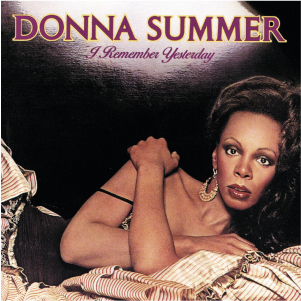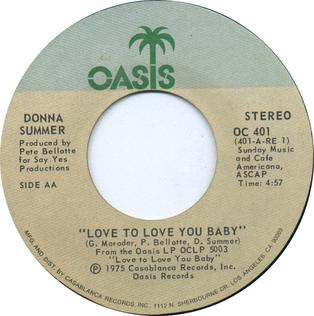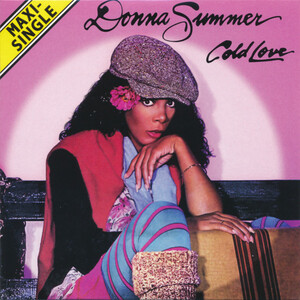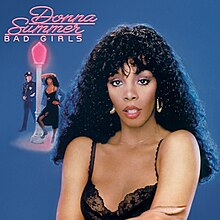
Donna Adrian Gaines, known professionally as Donna Summer, was an American singer and songwriter. She gained prominence during the disco era of the 1970s and became known as the "Queen of Disco", while her music gained a global following.

Love to Love You Baby is the second studio album by American singer Donna Summer, released on August 27, 1975, and her first to be released internationally and in the United States. Her previous album Lady of the Night (1974) was released only in the Netherlands. The album was commercially successful, mainly because of the success of its title track, which reached number 2 on the US Pop charts despite some radio stations choosing not to play the song due to its sexually explicit nature.

A Love Trilogy is the third studio album by American singer and songwriter Donna Summer. It was released on March 5, 1976, eight months after her international breakthrough with the single and album of the same name – "Love to Love You Baby". The bold, sexual nature of that particular song had earned Summer the title 'the first lady of love'. By now Summer's work was being distributed in the U.S. by Casablanca Records, and the label encouraged Summer, Moroder and team to continue in this vein. A Love Trilogy uses the first side for one long disco track in three distinct movements 'Try Me', 'I Know', 'We Can Make It', and coalescing into the "love trilogy" of the title – "Try Me, I Know We Can Make It". Side two contained three additional erotic disco songs, including a cover of Barry Manilow's "Could It Be Magic". The album's artwork showed Summer floating light-heartedly through the clouds, again adding to the image of her as a fantasy figure.

The Wanderer is the eighth studio album by American singer-songwriter Donna Summer, released on October 20, 1980. It marks a musical departure for Summer, being an album influenced by rock and new wave whilst previous albums all fell under the disco music category. Her inaugural release of the Geffen Records label, it became a top 20 album in the United States, with the title track reaching No. 3 on the Billboard Hot 100; other singles failed to enter the top ten. However, the record was more unsuccessful on the charts than her previous album Bad Girls, which topped the Billboard 200 for five weeks.

Four Seasons of Love is the fourth studio album by American singer-songwriter Donna Summer. Released on October 11, 1976, this concept album became her third consecutive successful album to be certified gold in the US. It peaked at #29 on the Billboard 200. In addition, all the cuts on this album went to number one on the disco chart.

Live and More is the first live album recorded by American singer-songwriter Donna Summer, and it was her second double album, released on August 28, 1978 by Casablanca Records. The live concert featured on the first three sides of this double album was recorded in the Universal Amphitheater, Los Angeles, California in 1978.

"Hot Stuff" is a song by American singer Donna Summer from her seventh studio album Bad Girls (1979), produced by English producer Pete Bellotte and Italian producer Giorgio Moroder and released as the lead single from Bad Girls in 1979 through Casablanca Records. Up to that point, Summer had mainly been associated with disco songs but this song also showed a significant rock direction, including a guitar solo by ex-Doobie Brother and Steely Dan guitarist Jeff "Skunk" Baxter. It is the second of four songs by Summer to reach number one on the Billboard Hot 100.

"Bad Girls" is a song by American singer and songwriter Donna Summer from her 1979 seventh studio album of the same name. Casablanca Records released it as the album's second single on June 23, 1979. The song was produced by Summer's regular collaborators Giorgio Moroder and Pete Bellotte, and co-written by Summer and the members of Brooklyn Dreams, Bruce Sudano, Joe "Bean" Esposito and Edward "Eddie" Hokenson.

I Remember Yesterday is the fifth studio album by American singer-songwriter Donna Summer. It was released on May 13, 1977, seven months after the release of her previous album. Like her previous three albums, it was a concept album, this time seeing Summer combining the recent disco sound with various sounds of the past. I Remember Yesterday includes the singles "Can't We Just Sit Down ", "I Feel Love", the title track, "Love's Unkind" and "Back in Love Again". "I Feel Love" and "Love's Unkind" proved to be the album's most popular and enduring hits, the former of which came to be one of Summer's signature songs.

Once Upon a Time is the sixth studio album by American singer-songwriter Donna Summer. It was released on October 31, 1977, and peaked at No. 26 on the US Billboard 200, number thirteen on the Top R&B/Hip-Hop Albums chart and No. 24 on the UK Albums Chart. The entire album charted as one entry at No. 1 on the Hot Dance/Disco chart. Once Upon a Time includes the singles "I Love You", "Fairy Tale High", "Once Upon a Time" and "Rumour Has It". The album did not spawn a hit single as popular as "I Feel Love".
Peter John Bellotte is a British songwriter and record producer most noted for his work in the 1970s with Giorgio Moroder and Donna Summer.

On the Radio: Greatest Hits Volumes I & II is the first greatest hits album by American singer Donna Summer, released on October 15, 1979. It was her fourth consecutive double album, and also made her the first person ever to take three consecutive double albums to the number one spot on the U.S. album chart. This would become Summer's third multi-platinum album to date.

The Dance Collection: A Compilation of Twelve Inch Singles is a compilation album by Donna Summer released in 1987. Summer had become the biggest star of the disco era in the 1970s when signed to Casablanca Records. By 1987, Summer was signed to the Geffen label, and Casablanca had long since been bought out by Polygram. This album was released on Polygram's Casablanca label. It features some of her most famous songs from the disco era in their extended 12" versions, as they would often have been played in the clubs during their popularity.

The Donna Summer Anthology is a double compilation album by the American singer Donna Summer, released by Polygram Records in 1993. The compilation featured the majority of Summer's best known songs right from the start of her success to the present day. Summer had originally made her name during the disco era in the 1970s and in the decade that followed had experimented with different styles. Most of the tracks on this compilation are the original album versions of the songs, which were sometimes edited down for their release as a single. Included for the first time are two remixed tracks from her then unreleased album I'm a Rainbow, which had been recorded in 1981 but was shelved by her record company. The album also featured the Giorgio Moroder-penned and produced song "Carry On"', marking the first time Summer and Moroder had worked together since 1981. Summer and Moroder, together with Pete Bellotte had written the vast majority of her 1970s disco hits. Four years later, "Carry On" would be remixed and become a big dance hit. It also won Summer a Grammy for Best Dance Recording, her first win since 1984 and her fifth win in total.

Endless Summer: Donna Summer's Greatest Hits is a compilation album by American singer-songwriter Donna Summer, released on November 8, 1994. It contains many of Summer's best known songs, from her 1970s breakthrough to the release of the album. Unlike 1993's The Donna Summer Anthology, which contains the majority of the songs in their original longer forms, Endless Summer generally includes single versions of the songs. However, the version sold in the United Kingdom uses the album version of the track "I Don't Wanna Get Hurt",, not the more club-oriented mix released as a single there.
Brooklyn Dreams were an American singing group of the late 1970s, mixing R&B harmonies with contemporary dance/disco music and best known for a number of collaborations with singer Donna Summer. The band consisted of Joe "Bean" Esposito, Eddie Hokenson and Bruce Sudano. Esposito provided lead vocals for the band and played guitar, while Sudano played keyboards and Hokenson played drums and occasionally sang lead vocals.

"Love to Love You Baby" is a song by American singer Donna Summer from her second studio album, Love to Love You Baby (1975). Produced by Pete Bellotte, and written by Italian musician Giorgio Moroder, Summer, and Bellotte, the song was first released as a single in the Netherlands in June 1975 as "Love to Love You" and then released worldwide in November 1975 as "Love to Love You Baby". It became one of the first disco hits to be released in an extended form.

"Dim All the Lights" is a song by American recording artist Donna Summer released as the third single from her 1979 album Bad Girls. It debuted at number 70 on August 25, 1979, and peaked that year at number two on November 10 and November 17 on the Billboard Hot 100. Produced by her longtime collaborator Giorgio Moroder with Pete Bellotte, the track combines Summer's trademark disco beats with a more soulful pop sound. It was the third Hot 100 top-two single from the album and her sixth consecutive Hot 100 top-five single.

"Cold Love" is a song by American singer Donna Summer, released as the second single from her album The Wanderer. The song was written by Harold Faltermeyer, Keith Forsey and Pete Bellotte and produced by Bellotte and Giorgio Moroder. It peaked at No. 33 in the Billboard Hot 100, and No. 49 in Cash Box. Summer earned a Grammy nomination for Best Female Rock Vocal Performance.

Foxes is the soundtrack to the 1980 film of the same name, starring Jodie Foster, Scott Baio, Sally Kellerman, Randy Quaid as well as The Runaways' lead singer Cherie Currie. The double-album was released on the disco label Casablanca Records.


















